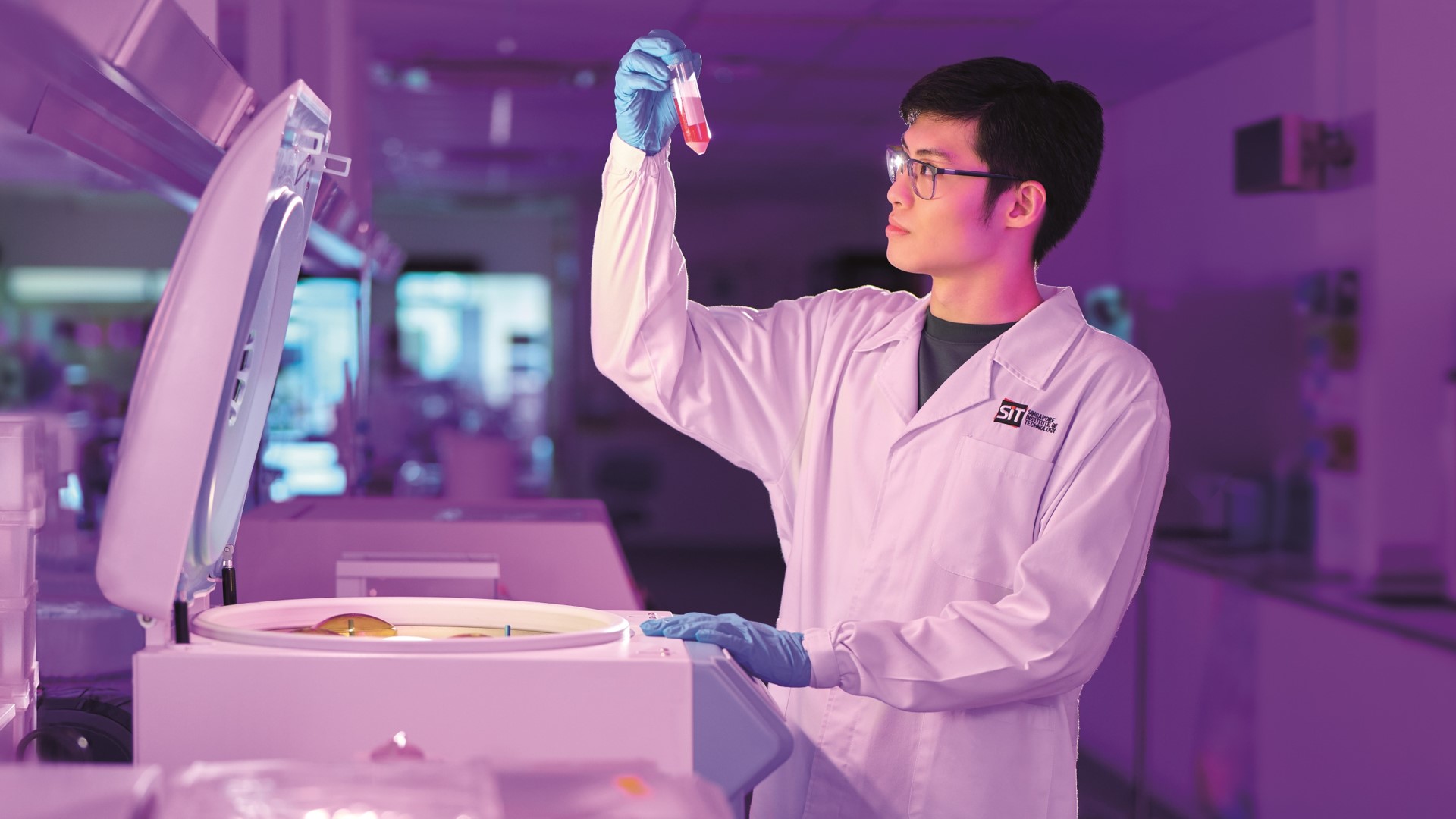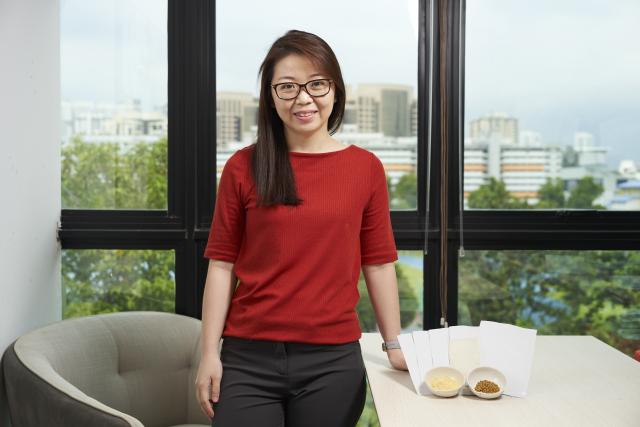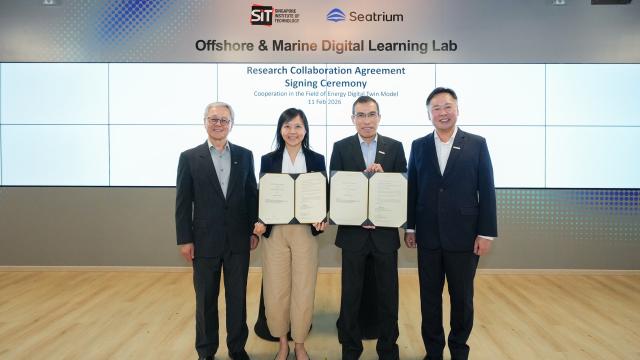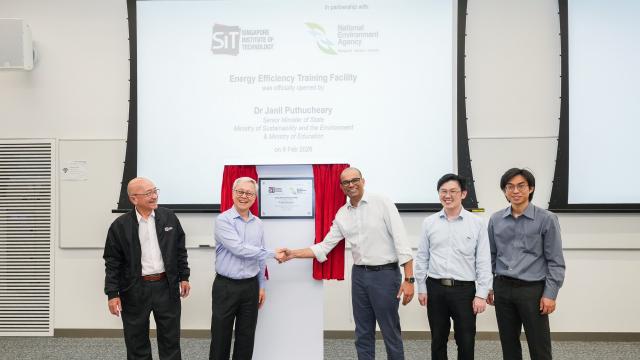Pharmaceutical engineers work behind the scenes and play a crucial role in the entire journey of pharmaceutical drugs we rely on.
They don't work in patient-facing pharmacies or hospitals, but pharmaceutical engineers donning personal protective equipment (PPE) in pharmaceutical plants apply their engineering expertise to ensure that safe and effective medications are produced efficiently.
With a market value of $2.2 billion, the local pharmaceutical sector has more than 9,000 skilled workers in Singapore's biopharmaceutical sector. Boasting world-class manufacturing plants, Singapore is home to leading global drug manufacturers like GSK, Pfizer, Roche, MSD and Amgen, where drugs and products manufactured in Singapore are distributed to the rest of the world.
Prospective students who are eager to set foot in the sunrise industry can apply for admission to the Pharmaceutical Engineering (PHE) programme offered by the Singapore Institute of Technology (SIT) until 19 March 2024.

Most leading pharmaceutical companies have a manufacturing presence in Singapore. Graduate employment surveys conducted by the university suggest that PHE graduates generally stay in the same industry. (SIT Photo: Amanacliq/Nicky Loh)
This four-year direct honours degree programme is the first of its kind in Singapore – with SIT the only autonomous university in Singapore to offer Pharmaceutical Engineering as a standalone degree programme. More spots are available this year as SIT increases the intake to meet the growing demand for pharmaceutical engineers in Singapore.
Graduates from the Pharmaceutical Engineering degree programme can look forward to exciting and diverse job opportunities with leading drug manufacturers. Past graduates have secured employment with global pharmaceutical companies such as MSD, Pfizer, GSK, Amgen and Novartis. Graduates who joined local pharmaceutical companies also had the opportunity to venture abroad by accepting overseas postings.
A Curriculum By the Industry, For the Industry
As with any other SIT degree programme, PHE students can look forward to an applied learning experience focusing on hands-on practical lessons and industry exposure. This combination ensures that students are trained across the full spectrum of drug manufacturing competencies – ensuring the needs of the industry are met.
The curriculum is developed in consultation with an Industry Advisory Committee, comprising industry experts who can advise on market and technological trends, and most importantly, the skillsets expected of graduates. Essentially, students from the degree programme are trained in the development and manufacture of biologics and small-molecule drugs.
“We work closely with industry partners to equip students with relevant skills that enable them to handle actual manufacturing processes and procedures in the workplace,” said Associate Professor Cheow Wean Sin, Programme Leader for the PHE degree programme. “We also ask them what they are looking for in fresh graduates, and we align our curriculum and pedagogy to meet their needs. Our graduates are trained for the local industry and the skills imparted apply to the pharmaceutical industry worldwide.”

The demand for SIT's PHE graduates is healthy as the industry grows, says A/Prof Cheow Wean Sin. (SIT Photo: Keng Photography/Tan Eng Keng)
Undergraduates will also get the chance to learn from industry practitioners engaged by SIT to teach selected modules as adjunct lecturers. This allows students to interact with pharmaceutical engineers and glean insights about real-world challenges.
Work-Ready Through IWSP
The flagship feature of SIT's degree and joint-degree programmes, the Integrated Work Study Programme (IWSP) allows students to undertake eight to 12 months of relevant work during their studies. As PHE students undergo 12 months of compulsory work attachment, they can gain practical, industry-specific experience and apply what they have learnt in the classroom to the real world.
Students also work on a capstone project where they identify an actual operational problem that their employer is facing, and propose practical solutions for them.
“The capstone project requires students to work on the company's problem rather than a hypothetical problem assigned by the university professor. This makes their learning more meaningful and authentic,” shared A/Prof Cheow.
Through the IWSP, students immerse themselves in the actual work environment. Upon graduation, many are able to start contributing immediately because of their work experience. It is also common for students to be offered full-time roles from their work attachment companies to continue their excellent work during their IWSP.
Students on IWSP placements are deployed in manufacturing’s downstream and upstream functions and marketing roles, with opportunities to perform in various specialisations such as quality control, validation, plant engineering, development services and continuous improvement.
Other than IWSP placements related to the manufacturing of drugs and medication, undergraduates have also worked in skincare and cosmetics. Some have even flown to the US and Korea to complete their work attachments abroad, while others have served as research assistants in A*STAR.
Elevating CVs through Applied Research Opportunities
From time to time, applied research positions are made available for PHE undergraduates keen to gain valuable experience as student researchers.
In the past, faculty members have received research grants and funds to help investigate existing problems that companies are invested in, such as manufacturing kale prebiotics and a hydrogel film to prevent post-surgery complications. PHE students with an interest in research had gone on to assist their professors in such projects.
Working on these applied research projects can help boost students’ CVs, make them more marketable to employers, and open doors to different career pathways after graduation.
The PHE degree programme is internationally recognised and accredited by the Engineering Accreditation Board. A handful of past graduates have gone on to pursue Master’s degrees and PhDs in related fields, both in Singapore and abroad.
PHE graduates are not limited to only the pharmaceutical industry as their skills are transferable and highly sought after. From pharmaceutical engineering, one can move into related food, fine chemicals, petrochemical and life sciences sectors with relative ease.
Apply Today
Those who have a desire to explore career pathways in knowledge-intensive industries that improve people's lives can take the first step by applying for SIT’s PHE degree programme.
Admissions to SIT is open from now until 19 March 2024.















![[FA] SIT One SITizen Alumni Initiative_Web banner_1244px x 688px.jpg](/openhouse2025/openhouse/sit-teaching-and-learning-academy/centre-professional-communication/directory/openhouse/centre-professional-communication/directory/sites/default/files/2024-12/%5BFA%5D%20%20SIT%20One%20SITizen%20Alumni%20Initiative_Web%20banner_1244px%20x%20688px.jpg)


